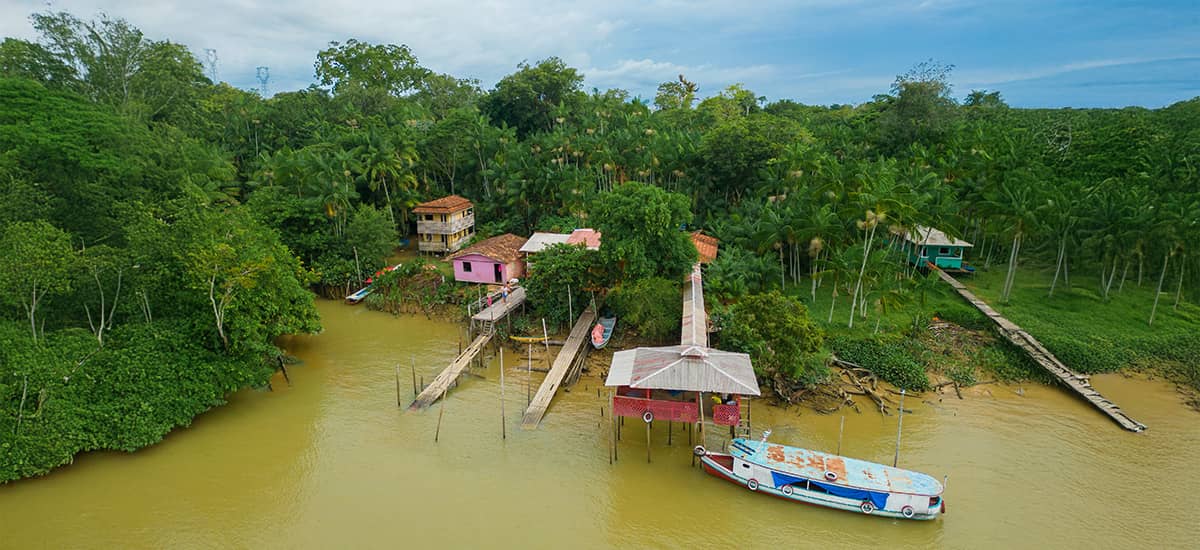
In the depths of the Amazon, market power takes unexpected forms. Far from the corporate boardrooms of São Paulo or New York, economic concentration can determine whether small producers thrive, whether forests stand, and whether communities escape poverty.
Two recent studies on the Amazon—one on fishing communities, the other on the cattle industry—show how unequal bargaining power along supply chains shapes both livelihoods and the environment. They reveal how unequal access to markets can limit competition, harm producers, and wreak havoc on delicate ecosystems.
It is one of the principal themes of an upcoming IDB Development in the Americas flagship report, soon to be released, which advocates for removing impediments to competition—including regulatory and other barriers— for the benefit of growth, innovation, and social welfare in Latin America and the Caribbean.
Fishermen and the Cooperative Investments that Can Reduce Middlemen’s Power
In remote river communities of the Brazilian Amazon, life revolves around the pirarucu, a giant freshwater fish that can reach three meters and weigh more than 200 kilograms. Each year, during the short fishing season, families hunt pirarucu in nearby lakes and sell it to passing traders. These middlemen arrive by boat, buy the catch, and resell it to processors and retailers hundreds of kilometers away. For many years, these traders formed a tight cartel that effectively dictated prices.
A study by Viva Ona Bartkus, Wyatt Brooks, Joseph Kaboski, and Carolyn Pelnik evaluated an NGO program that tried to break this dependence. With support from the Fundação Amazonas Sustentável, groups of fishermen pooled resources to acquire large boats equipped with ice storage, allowing them to bypass the middlemen and deliver their fish directly to markets in Manaus. The results were striking. In the first year, communities with boats earned 27% higher incomes than those still reliant on intermediaries, even though they did not fish more or work longer hours. The gains came mainly from better prices—about 20% higher per kilogram of fish—and from new bargaining power vis-à-vis the traders.
The project also proved highly cost-effective. The increase in income was large enough that the boats paid for themselves in less than three years. Significantly, households used part of the extra income to increase their food consumption, suggesting real improvements in welfare rather than short-term windfalls.
In other words, even where nature is abundant, monopsony power—a few buyers facing many small sellers—can keep communities poor. Correcting that imbalance does not necessarily require large infrastructure projects or subsidies. Sometimes, targeted cooperative investments can loosen the grip of middlemen and unlock local development.
Environmental Regulations That Limit Competition and Harm the Environment
A second study, by Marcos Barrozo, looks at a different supply chain—cattle rather than fish—but the same underlying problem. Cattle ranching is an important driver of deforestation in the Brazilian Amazon. Yet the story is not simply one of farmers clearing forest for profit. It is also one of distorted market structures that shape where and how production takes place.
Using detailed data tracing cattle movements from ranches to slaughterhouses, Barrozo finds that meatpacking firms exercise substantial monopsony power: they are the dominant buyers of cattle in many local markets. The pattern varies geographically. Near ports and major cities, a few large, export-authorized meatpackers dominate. In more remote regions, by contrast, many small, often informal meatpackers oriented more towards the domestic market compete for cattle. At first glance, this competition should help ranchers. But there is a paradox: the most competitive markets are also the most polluting.
Because remote areas hold denser forests, increased competition shifts cattle production toward zones with higher carbon emissions. Meanwhile, environmental policies that target only exporters—such as sustainability requirements or tariffs on export-authorized firms—can backfire. By discouraging the entry of large, more productive meatpackers, such policies push activity toward informal firms, selling domestically and not subject to the same regulations, in high-emission regions.
The implication is sobering: environmental regulation that ignores market structure can be counterproductive. In the Amazon, policies must account for how firms with different sizes and productivity interact across space. Strengthening formal firms and raising entry barriers for high-emission, low-productivity slaughterhouses may, paradoxically, lower both emissions and prices for consumers while improving overall welfare.
Together, these two studies reveal a deeper connection between market power, development, and sustainability. Whether the product is fish or beef, whether the harm is poverty or deforestation, unequal access to markets can produce inefficiency and waste. Market power is not confined to multinational giants; it is also exercised by small clusters of intermediaries that dominate thin local markets, shaping who benefits from natural resources and who bears the costs.
These Amazonian stories highlight a central theme for Latin America and the Caribbean. Across the region, fragmented markets, regulatory barriers, and entrenched incumbents limit competition and innovation. The consequences—lower productivity, informality, and inequality—echo far beyond the rainforest. The same forces that trap fishermen in poverty and misallocate cattle production also hold back entire economies.
The IDB’s Upcoming Flagship Report
These insights are part of a wider research effort at the IDB. Later this year, the IDB will release its new flagship report, Development in the Americas (DIA), titled Markets for Development: Improving Lives through Competition. The report quantifies how weak competition across sectors—from banking to labor to logistics—reduces growth and opportunity across Latin America and the Caribbean. The message, as the Amazon shows, is clear: the region’s challenge is not too much market freedom, but too little competition.


Leave a Reply